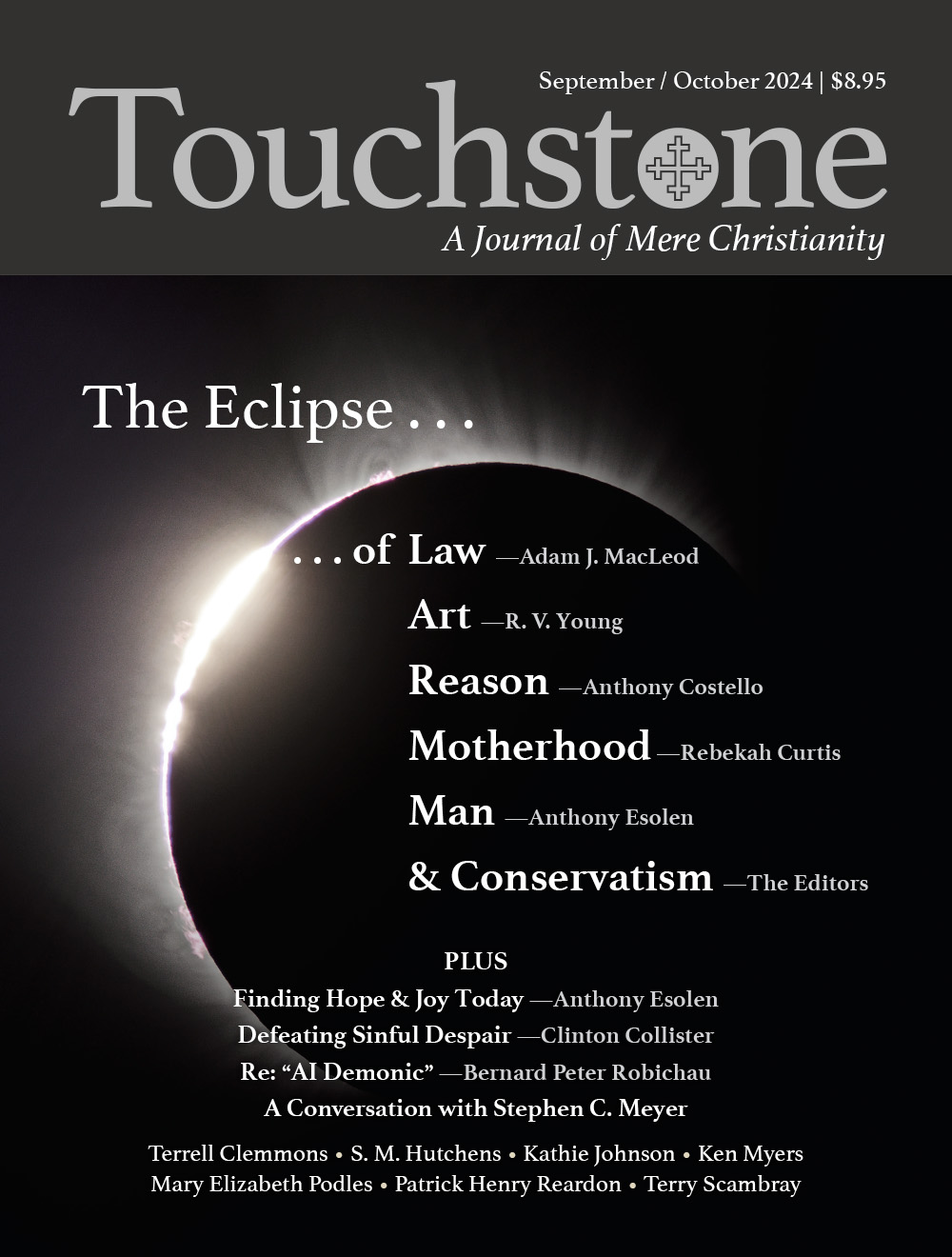Great & Wonderful Days
The Death of Conservatism & the Negative World
by J. Douglas Johnson
conservatism: (n.): a political movement grounded in the realization that one’s nation has abandoned certain irretrievable morals and manners, practiced by their ancestors as a matter of habit, whose loss is now belatedly understood as a key contributor to national decline.
In the wake of the July 2024 British elections, Peter Hitchens announced that conservatism is dead, gone, kaput. His tone was matter-of-fact, but anyone who perused his July 5 UnHerd column (“So. Farewell then conservatism”) could read the anguish between the lines.
Hitchens isn’t wrong. The conservative electoral victories over the last half-century did nothing to alter our respective nations’ liberal trajectories, which have brought us to where we are today. Violent crime did fall precipitously in the eighties and nineties but has now returned to levels not seen previously during the lifetimes of most Westerners. Conservative policy victories, too few and far between, have proven fleeting (remember Welfare to Work?), while our liberal trajectory perdures.
No one likes the collapse of the family, poorly educated children, and more criminals on our streets, not to mention our ever-expanding governments and unfathomable levels of national debt, which we may soon be unable to finance, let alone ever repay. But many conservative voters are, at best, ambivalent about these things. Some want to preserve their access to things made available by the laws that helped usher in our cultural decline, like no-fault divorce. The more steadfast have grown weary of playing Charlie Brown to the Tory and Republican Lucys, who beckon us to kick the football in one more election, promising that, if only we give them our votes, this time around they really will set things right. Many voters on the right have apparently concluded that they would rather not vote than be played for the fool for another twenty or thirty years.
That said, we can’t really put all the blame on the politicians who run as conservatives. Conservatives rely on slippery slopes to win votes, which is a losing proposition over the long term. Before the country slipped down that slope, conservative politicians sounded half-nuts for suggesting that the left had a secret plan to actually take us there. And then, almost immediately after our arrival at the bottom, about a third of conservative voters accepted and adapted to the new normal, while another third lamented the slide but then quickly abandoned the fight as yet another hill not worth dying on. Those who make up the remaining third (which includes most Touchstone readers) find themselves crushed, not by Democrats, but by a political vise made up of the other two-thirds of their own party.
Take, for example, the government redefinition of marriage.
Today, President Trump is more supportive of the government redefinition of marriage than either President Clinton or President Obama had dared to be, and he hosts LGBT fundraisers at Mar-A-Lago. And about half of voters who identify as conservative now say they support an idea that was too leftwing even for Obama in 2008.
What Is Conservatism?
In 2020, The American Conservative published a symposium in which each contributor was asked to submit a thousand-word answer to the question, “What is Conservatism?” Here is a selection of some of the most popular ideas expressed in that symposium:
• “the habits, traditions, ideas, and institutions . . . that best promote virtue and ordered liberty”
• battling our shrinking fertility rates
• battling our spiritual crisis
• “a disposition of gratitude”
• “a turn to history in an attempt at anamnesis”
• “the belief that human nature is immutable”
• the protection of the family and the church
• self-control
• “seeking that which is everlasting”
• “seek[ing] to protect the main aims of a well-lived life for ordinary people”
And so on, not one of which could be brought about or cultivated by politics, even if The American Conservative contributors could handpick every member of the House, Senate, and White House.
It is important to remember that none of the sine qua nons that made the contributors’ lists were regarded as conservative when people used to do them; they were just the unremarkable and unnoticed ways in which everyone went about his life without ever thinking about it.
Before an item can make anyone’s list of what constitutes conservatism, three things must transpire (or have transpired) in our culture:
1. We must have abandoned a once-universal habit. Most people will have had to stop doing something that everyone—not just those on one side of the political divide, but everyone—once did as a matter of habit. It is only after such habits have ceased that we can see that we’ve abandoned a once-universal practice.
2. We must feel its loss. There must be widespread agreement that our lives have taken a turn for the worse absent the old habit.
3. We must realize that this good and vital practice is unlikely ever to return as a cultural norm. It’s not that the old habits are difficult to do. It is not hard to set aside a little time each day to read the Bible or to attend church at least weekly. But once most people stop doing these things, they are unlikely to begin anew. And the politicization of these once-universal habits is the greatest assurance that they will never again be universal.
This means that conservatives never could have fought a “culture war” to conserve these habits because, by the time we decided to fight, there was nothing left to conserve. Pretending otherwise won elections for many Republican candidates—and we were glad for that—but the foundations of Western civilization cannot be rebuilt by party politics. For as long as we sustain our utopian beliefs in our national religion that is politics, we will assuredly continue along our liberal trajectory.
The Negative World
All of this relates to the theme of our 2024 conference, Life and Death in the Negative World, a title drawn from Aaron Renn’s book on the subject. Renn argues that from 1964 to 1994, most Americans held a positive view of Christians and Christian morality, whether or not they were Christian themselves. But beginning in 2014, and for the first time in our nation’s history, a majority of Americans have looked upon Christian morality in a negative light. Life in the West has grown increasingly unpleasant for Christians ever since.
In the Positive World, the church and state lived in relative harmony with one another. Being a good Christian was part of being a good American, and vice versa. Sure, the church pushed back against the world, but gingerly, so it, too, drifted along our nation’s liberal trajectory.
Even the various failed attempts at pushback by prominent Christian leaders, such as Jerry Falwell’s Moral Majority and Pat Robertson’s and Ralph Reed’s Christian Coalition, were entirely political operations that appealed to only one faction (practicing Christians) of one political party. Thus, they politicized these once-universal habits and limited their appeal to less than one-half of the country.
Still, I use the word “conservative” everyday because no other word conveys the same meaning. And, during most of our time in the Positive World, that word told me more about a person, a town, a magazine, or even a church than did “Christian.” But there was never any way to use the word free from its vulgar political context.
In the run-up to the 2024 RNC convention, the conservative party, the Republican Party, finally did what the New York Times spent the last half-century lobbying it to do: it removed the sanctity of life from the party’s platform. And to make clear where the party now stands, it invited Amber Rose to speak, a woman who recently said that satanists were good people because they helped women obtain abortions.
We wish the Republican Party hadn’t altered its platform, and we wish it hadn’t invited Amber Rose to speak as a representative of what the party now endorses (and let’s not kid ourselves; she representswhat the party now believes). But in the Negative World, American Christians should no longer expect to find safe sanctuary in the GOP.
The reality is that we have only ever lived in the Negative World. Even though Christians knew long before any of us was born that our nation was drifting away from the church, we lived for a time under the Positive-World illusion that Christian notions of right and wrong would endure, if not in the world, then at least in the West, and if not in the West, then at least in the United States. And if not even in the United States, then in the Republican Party at the very least of all.
Now that we can see the world for what the Bible tells us it has always been, we may all soon see what the Venerable Fulton Sheen saw more than a half-century ago, when he looked upon our Negative World and announced the “end of Christendom” yet affirmed that:
these are great and wonderful days in which to be alive. . . . It is not a gloomy picture—it is a picture of the Church in the midst of increasing opposition from the world. And therefore live your lives in the full consciousness of this hour of testing, and rally close to the heart of Christ.
—J. Douglas Johnson, for the editors
J. Douglas Johnson is the executive editor of Touchstone and the executive director of the Fellowship of St. James.
subscription options
Order
Print/Online Subscription

Get six issues (one year) of Touchstone PLUS full online access including pdf downloads for only $39.95. That's only $3.34 per month!
Order
Online Only
Subscription

Get a one-year full-access subscription to the Touchstone online archives for only $19.95. That's only $1.66 per month!
bulk subscriptions
Order Touchstone subscriptions in bulk and save $10 per sub! Each subscription includes 6 issues of Touchstone plus full online access to touchstonemag.com—including archives, videos, and pdf downloads of recent issues for only $29.95 each! Great for churches or study groups.
Transactions will be processed on a secure server.
more on politics from the online archives
more from the online archives
calling all readers
Please Donate
"There are magazines worth reading but few worth saving . . . Touchstone is just such a magazine."
—Alice von Hildebrand
"Here we do not concede one square millimeter of territory to falsehood, folly, contemporary sentimentality, or fashion. We speak the truth, and let God be our judge. . . . Touchstone is the one committedly Christian conservative journal."
—Anthony Esolen, Touchstone senior editor












